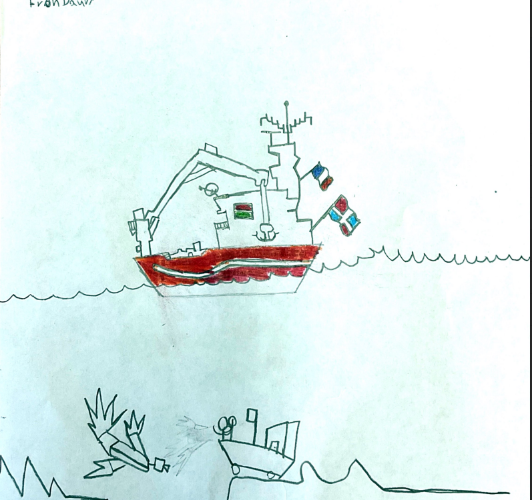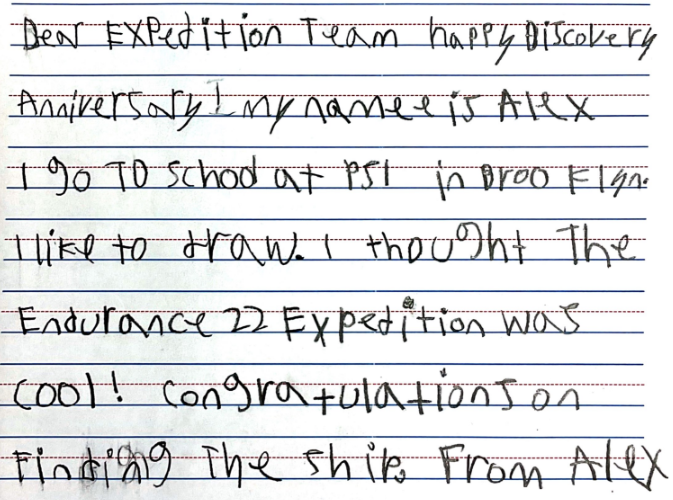
September 2023 will be the start of my 20th year as an educator. This is equal parts comforting, exciting and terrifying. It is terrifying to see how quickly 20 years can fly by, yet extraordinarily comforting and exciting that although I know so much more than I did in September 2004, I still have so much more to learn about the art of teaching. The 2022-2023 school year was quite eventful for our learning community. The students and families in room 307 were presented with amazing opportunities rooted in their strengths and driven by their interests. It was a pleasure to be an observer and facilitator for this group of students as they shifted their mindsets and discovered they could use their voices to advocate for themselves.
At this moment, I find myself being a bit more contemplative in my professional reflection than I have in recent years. Perhaps it is due to this career anniversary, the joy we experienced as a learning community during the 2022-2023 school year or my own personal growth as a human outside the classroom. Some of my regular readers have noted that it has been awhile since I updated my blog. I could truthfully attribute my silence to the time it takes to be a responsive educator in a special education classroom. From September to June, planning, teaching and reflecting takes up a lot of my time and there are only so many hours in a day. However for most this summer, it has been difficult for me to jump back into this space as a writer. I needed extra time to find the right threads for this reflection. Initially, I wanted to separate my reflection on the previous school year from my goals for the upcoming school year. I have a lot that I can share about the inquiry-based work my students engaged in this year and those posts will likely follow with the next few weeks. However, I can't separate my new learning from my hopes and goals for the future. They go hand in hand and that is the core of what it means to be a responsive educator.
In June 2023, I had my students participate in a reflective thinking routine. In small groups, they went around the room and charted their Glows, Knows & Grows. We used the charts to guide our discussion afterwards. This thinking routine gave me the perspective I needed to begin planning for the 2023-2024 school year It also gave my students the opportunity to look back at how far they had come before walking the road to middle school.

Because the roots for this blog come from this thinking routine, I am going to use this same structure as I look back at how far we came as learning community and prepare to walk the road with a new group of learners and their families.
Glows: What went well in our classroom this year?

From the discussion my students had about our glows, I learned that our science and social studies activities were the highlight of our year. The students shared that they loved exploring molecules through food science, creating terrariums and sprouting beans to learn about the impact of deforestation. They loved exploring the food and customs of Israel and Turkey. They loved participating in virtual exchanges that helped them build relationships with travelers, explorers and scientists from all over the world. They loved our trips and guest speakers and saw the connections to our work in social studies and science. They loved playing games to help them improve their reading and math skills.
What about my perspective? What do I think went well? I agree with each of the "glows" my students named during this discussion and I can share a little bit about the planning and thinking that resulted in these positive classroom experiences.
Although thematic, student-centered instruction has been the foundation of my planning for several years, I fully embraced inquiry-driven science instruction during the 2022-2023 school year. In the past, science was not something I taught with great confidence. This is likely related to the tone that was used when our current science curriculum was implemented a few years ago. At its implementation, it didn't feel like there would be room for mistakes and that there would be grave consequences if we didn't follow the curriculum with integrity. This year, I chose to ground all those units in the Sustainable Development Goals and I decided I would not be the teacher in science - I would be the facilitator. This change in perspective, in combination with the growth mindset unit we carried out in SEL, helped us to celebrate mistakes and ask questions as a scientific community. We were learning together and the students were the drivers of discovery during science; just like the scientists that they spoke to through virtual exchange and during our in-person school visits.
Due to my experience in the Global Education community, I have always had an inquiry driven focus in social studies. However, this year I made an extra effort to include more hands on activities and to make sure that relationships were at the foundations of all our virtual and in-person exchanges. We didn't just read about glaciers and watch videos about the impact glaciers had on the geography of the western hemisphere! We made glaciers using clay! We didn't just read about Israeli food and speak to our Reach the World traveler, Mike, about the food he ate while on a road trip to Jordan! We found a local Israeli restaurant and planned our class meal using our new learning! We didn't just read about the one-year Discovery Anniversary of the Endurance22 expedition! We watched a video chat with the scientists that found Shackleton's ship and sent them anniversary cards! Truthfully the lines between our reading, writing, science and social studies periods became so thin that the students had trouble seeing when one period ended and the other began. They also so frequently used video chats and writing to communicate with people around the world, they now have this expectation that they will always be able to communicate with their heroes and role models around the world. They left fifth grade understanding the true power their voices can have when they advocate for themselves.
So how will this impact our 2023-2024 school year? Some aspects will not change and I will do my best to bring the same quality experiences to my new students. I am going to continue grounding all our learning in thematic, inquiry-driven instruction as I respond to Individualized Education Plans and the NYS Next Generation Learning Standards. I am also going to facilitate opportunities that promote hands-on learning and relationship building with the global community.
However I wonder, how can I bring more inquiry-driven opportunities to my math instruction? Due to the gap between my students' present level of performance and grade level standards, a lot of time is spent on direct instruction. It is clear from my discussion with my students that engagement increases through opportunities that promote exploration and play.
How can I create more opportunities for inquiry in math when my students are so far below grade level in math and every lesson feels like an emergency?
I would also like to do a little more research on the impact that gamification has on learning. A large group of my students enjoyed and benefited when I incorporated Gimkit and Prodigy into our reading and math centers. I would love to be able to slow down and explore the best ways to incorporate games across the school day because when learning is built on exploration and play, students are better able to transfer skills across subject areas.
Knows: How did your brain grow this year?

The discussion about our "knows" became difficult to separate from our "glows." The students noticed that if we felt something went really well in our classroom, it was connected to how much more confident we felt about the content. They specifically noticed the connections between social studies, science and reading on the two charts. They also acknowledged not everyone agreed on each point written on the charts because each of them were different learners. They noticed that multiplication and division felt easier for some students than it did at the beginning of the year. Many of those students shared that their growth was related to the games we played during math centers and small groups. Another big noticing by the students was that not all of our "knows" had to do with a subject area. Many of the "knows" had to do with facing challenges, advocating for ourselves and increased confidence.
What about me? How did my brain grow as an educator? I learned that the vocabulary strategies I incorporated in reading instruction from my professional development on English Language Learners was beneficial to all tiers of English Language Learners in my classroom. I learned that gamification and targeted small groups in reading and math helped my students make progress towards their IEP goals. I know that clear success criteria in all classroom experiences helps to increase student confidence. I learned that parents and students should have a voice in creating success criteria. I know that students make more progress when mistakes are celebrated and risk-taking is encouraged. I learned that it is important to step back and let the students be drivers of discovery. I learned that the process is much more important than the task.
So what does that mean for the 2023-2024 school year? Well, many of my daily practices such as targeted centers, small groups and vocabulary scaffolds are going to continue. I am going to make sure that the quality of our success criteria improves and is more publicly available to the families I am supporting.
Finally, I want to build on the classroom culture we have created around growth mindset by incorporating visual thinking routines that shift us fully into a culture of thinking. This will help to increase my students' confidence and support their speaking, listening, and writing goals.
Grows: What did not go so well this year? How could we make things better?

During our class discussion, many of the students shared that this was the most difficult chart to write on because they enjoyed our school year together so much and that they were really worried about hurting my feelings. This was a very empathetic group of students. They eventually thought about their "grows" in 3 different ways:
Academic areas they wished they had made more gains in
Academic areas they wanted to explore more about because they found them so exciting
Events that they felt they had no voice in or control over
It was clear that many of the students were unhappy with the state testing schedule in the spring. There were also some students that shared they didn't enjoy writing or wished they had made more progress with their spelling. Still others were unhappy with their progress in reading and math. Others wished they had been able to have more time in social studies and science activities. When I looked at this feedback there were three points that jumped out at me:
Some of the texts in our reading curriculum were not engaging or interesting
Not all the homework was clear and purposeful
It was difficult for my students to see their progress and growth as writers
As an educator, I wish that I had been able to find a way to increase family engagement in the classroom; not just through texts, phone calls and video chats. I also wish that I had been able to include more thinking routines and speaking protocols to support engagement, questioning and discussion across all subject areas.
So what does this mean for our upcoming school year? I can't do anything about the timing of state exams and I'm sorry that not everyone's plant made it when we sprouted beans.
However, I can respond to my students' concern about homework and writing. I make success criteria and progress clear and purposeful as we shift from a work-based culture to a culture of thinking.
I can make modifications and accommodations when planning the lessons for our reading curriculum. Incorporating thinking routines into those lessons will most likely increase engagement, comprehension, questioning and discussion. I also would like to invite at least 5 parents or family members to come into the classroom during the course of the school year to teach us something or learn with us.
Reflecting with my students in this way, has really supported my development as a responsive educator and has had a significant impact on the way I set goals at the beginning of the school year. Taking all this time to think about what my students shared and my own observations has resulted in me walking into the new school year with greater intent and focus. Typically, I am overwhelmed with 10 or more unlinked small goals at the beginning of a school year. I usually only get to address 1 or 2 of them and that leads to me feeling very inadequate when I think about all those goals I didn't have time to address. It's a huge relief to walk into a new school year without that unnecessary fear of failure and self-doubt.
I will continue to carry out this reflective thinking routine with my students next year, but with two additional changes. First, I want to use this thinking routine in December 2023 with students before we have our winter holiday, in addition to implementing it in June 2024. I noticed during our discussion that many of the students had trouble drawing on experiences prior to the winter holidays. A mid-year check in will help to better respond to the needs of my students and their families and give us a moment to pause and celebrate the progress already gained.
As I drafted this blog, I also started to wonder what the families of my students would have shared about their "Glows, Knows & Grows." I would like to implement this thinking routine at least once with families next year so that I can continue to be sure their voices are reflected in our success criteria and I am being responsive to their needs.
One could argue that this thinking routine is no different than filling out an end of course survey. However, I would counter that the community conversation throughout this thinking routine provides an authenticity that cannot be captured on a course survey.
I doubt that my students from the 2022-2023 school year really understand the deep impact they have made on my future students by providing me with their feedback. They will be forever connected to this incoming group of students. Unwittingly, they have forged a legacy in which student voices advocate not only for themselves, but for all the students who come later. I'm excited to know that 20 years in, I still get the opportunity to learn with and from the drivers of discovery in my classroom: my students and their families.







































































Comentarios